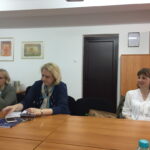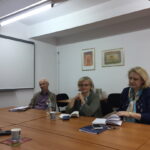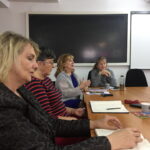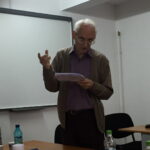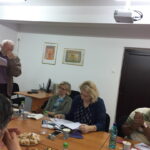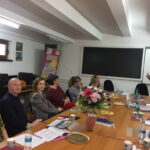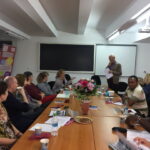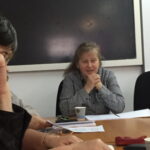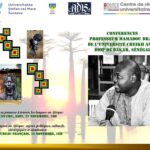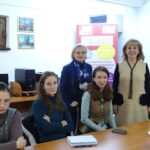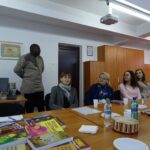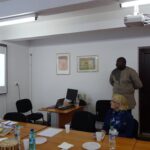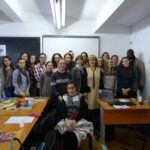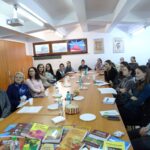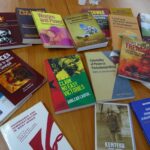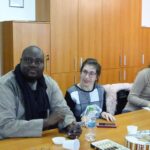- 8 June: Round table «Limbi, limbaje, discursuri. Aspecte discursive în spațiul on-line»
- 21-22 November: Conferences Prof. Mamadou Dramé
On June 8, 2017, Centrul de Reușită Universitară (CRU)hosted the Round Table on «Limbi, limbaje, discursuri. Aspecte discursive în spațiul on-line». Organized by prof.univ.dr. Sanda-Maria Ardeleanu and lector univ.dr. Ioana-Crina Prodan, the event brought together professors, doctoral and postdoctoral students, both from the “Stefan cel Mare” University, as well as international scholarship holders “Eugen Ionesco”.
In close connection with the main theme of the CADISS research proposed for 2017, the Round Table was a great opportunity to participate in the defense of two extremely interesting conferences whose themes fully responded to the challenge launched by the title of the event. A first moment was achieved by Ms. Mariana Boca, PhD, by presenting an interdisciplinary conference through which she succeeded in demonstrating the powerful influence that language sciences exert on criticism and literature, often transforming literature into veritable facts of language, literature thus becoming a practice of language.
At the same time, as a carrier of truth and knowledge, literature was analyzed under two defining aspects, that of fiction and non-fiction, respectively, two axes of textual investigation extremely topical and productive for the correct interpretation of the meaning of an author’s writing in search of truth.
The next part of the event was dedicated to a type of discourse that is very present in the current communicational reality, the media discourse, whose online valences were pertinently revealed by the lecture given by Mr. I.C.Corjan. In terms of nature and medium, the on-line space is a defining element for this type of discourse to be considered a type of on-line communication or, to use another phrase, “discourse launched on an on-line medium”. Firmly anchored in the series of researches carried out by CADISS members, the conference opened up new avenues of discursive investigation in an extremely generous, dynamic and rewarding communicational space. The moderator of the event, Prof. Sanda-Maria Ardeleanu, announced and presented in detail, at the end of the event, the publication of a new issue of the ANADISS journal, the first issue of Hors-série, dedicated entirely to the academic Johannes Kabatek, Doctor Honoris Causa of the University of Suceava, a homage volume coordinated by Sanda-Maria Ardeleanu, Ioana-Crina Prodan and Cristina Bleorțu.
Former scholarship holder of the Romanian Government under the “Eugène Ionesco” program and present as a postdoctoral fellow at the “Stefan cel Mare” University of Suceava in 2010, Professor Mamadou DRAMÉ from the Cheickh Anta Diop University of Dakar, Senegal, returned to Suceava on a teaching and scientific mission from 19-23 November 2017.
On Tuesday, November 21, 16.00, at Centrul de Reușită Universitară, in collaboration with Centrul de Cercetare Analiza Discursului, “Stefan cel Mare” University of Suceava, Professor Mamadou DRAMÉ gave a lecture “Vivre sa jeunesse à travers les langues en Afrique”.
On Wednesday, November 22, at 18.00, the French Office hosted a conference dedicated to the francophone and francophile public in Suceava, entitled “Les langues en Afrique: enjeux politiques, culturels, idéologiques et identitaires”, held by the same professor, within the “Afternoons of the francophone”.
Abstracts
Vive sa jeunesse à travers les langues en Afrique
From an early age, young Africans are immersed in multilingualism, which affects all aspects of their lives. They are divided between foreign languages (French and English), which are the languages of schooling in countries formerly colonized by France and England, and local languages, which are their first languages and are spoken in the family and used in everyday interactions. Then there is the lingua franca, as in Senegal, Gambia and Mali, which serves as a link between communities with different linguistic backgrounds. Depending on religion, Arabic, the language of Islam, is introduced.
In this labyrinth that characterizes their linguistic and identity trajectories, young people find their own way to carve their own identity at the intersection of all these languages and all these influences, to forge their own language at the intersection of all these influences, which can be called the language of youth. We will try to read these issues in the light of rap music, which is the music of expression of young people.
Les langues en Afrique : Enjeux politiques, culturels, idéologiques et identitaires
Languages are certainly a means of communication, but they are also vectors of knowledge, recognition and self-recognition, especially in Africa, where there are more than 2 000 local languages in addition to the languages inherited from European colonization and Arabic. All the countries are members of the Francophonie, the Commonwealth or the Arab Maghreb Union, making the language issue a question of political and ideological positioning. Added to this are the identity issues that make local languages seem like languages of expansion, in danger of killing off other languages and cultures that are said to be in danger. In this paper, we will analyze the different political, cultural, ideological and identity aspects of the language problem in Africa.
Press:
https://www.monitorulsv.ro/Local/2017-12-07/Un-senegalez-la-Suceava

